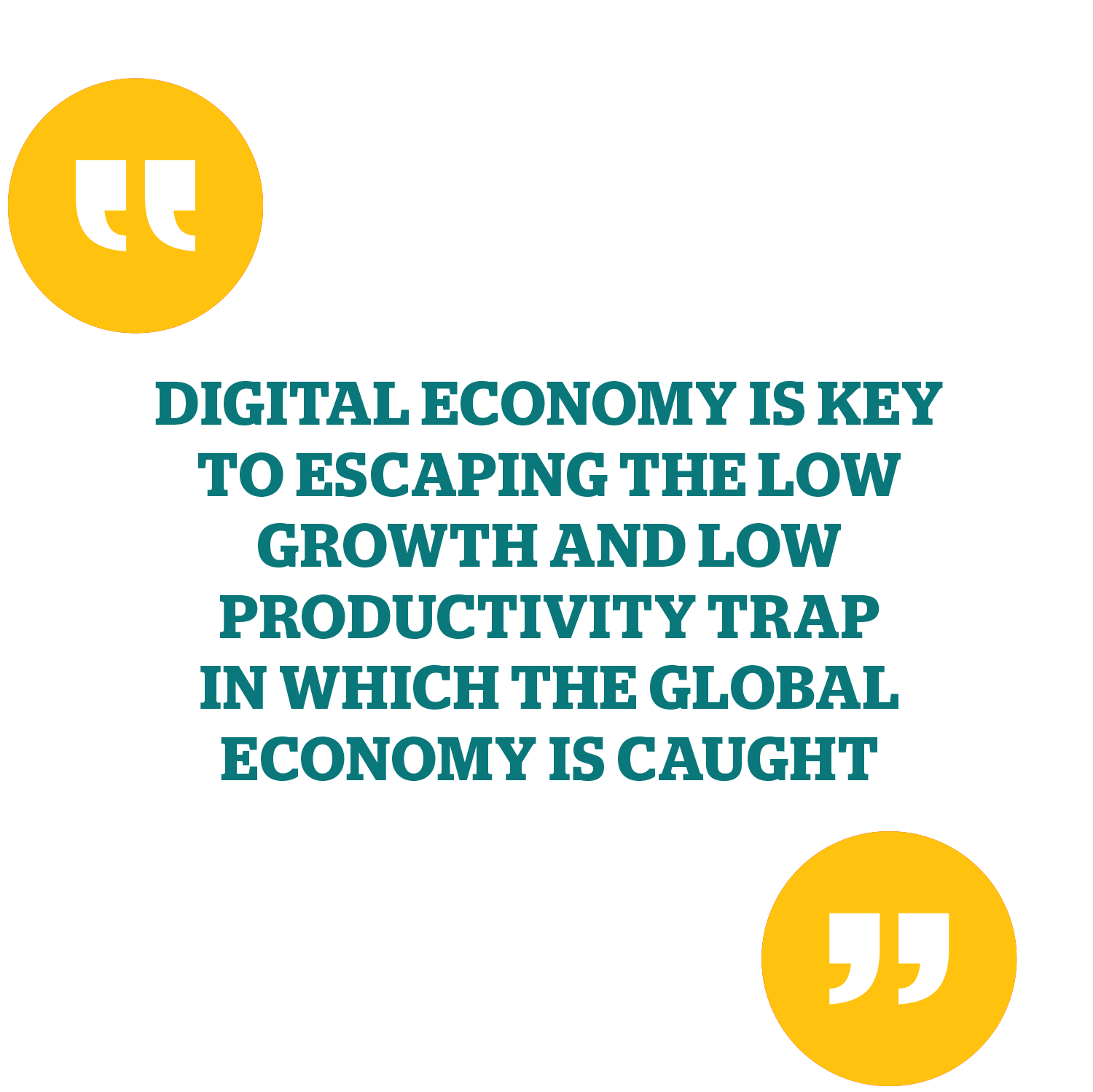G20 Executive Talk Series
GCEL
HARNESSING THE POTENTIAL OF
THE DIGITAL ECONOMY
GABRIELA RAMOS – SPECIAL COUNSELLOR TO THE SECRETARY-GENERAL AND OECD SHERPA
The digitalisation mega-trend is realising wide-ranging economic and social implications, and this transformation must be responsibly managed, with the focus of policy-makers on enabling individuals, communities and businesses to adapt and continue to benefit. Critically, harnessing the potential of the digital economy is key to escaping the low growth and low productivity trap in which the global economy is caught.
We have reason to be optimistic because progress has been significant, with 40% of people world-wide now connected to networks, compared to just 4% in 1995. By 2030, 8 billion people and 25 billion active “smart” devices will be interconnected in one huge information network1. Yet, today only 25% of individuals are using simple office software, such as word processors and spreadsheets, at work. And among them, over 40 per cent do not have sufficient ICT skills to use these tools effectively. By the same token, firms have seen broadband connectivity rise swignificantly, to the point that it is almost universal in many G20 economies. Between 2010 and 2014, it rose by almost 30 percentage points in Mexico. At the same time, important differences in ICT adoption and usage exist between large and smaller firms. For example, while broadband access and basic applications such as websites are common among most firms, more advanced applications, such as cloud computing or e-sales are used by a much smaller share of firms. The complexity of digitalisation is stunning, and the policy implications considerable.
This is why in 2016, under the Chinese Presidency, G20 Leaders endorsed the G20 Digital Economy Development and Cooperation Initiative, and then early this year, under Germany’s chairmanship, G20 Ministers responsible for the Digital Economy met for the first time, and endorsed a G20 Roadmap for Digitalisation: Policies for a Digital Future.
The OECD supports the G20 digital agenda by sharing its whole of government perspective, which is essential to understanding and responding effectively to this wide ranging transformation. This broad perspective underpinned the recent OECD report to the German Presidency on Key Issues for Digital Transformation in the G20. The latter highlights, in particular, four challenges:
Firstly, digitalisation is driving structural change, leading to the demise of sectors, creating new ones and leading to new sources of growth for traditional industries. It also offers economic development opportunities to leapfrog, as witnessed by Kenya’s growing FINTECH hub, or in my own country Mexico, where demand for robots grew by 119% in 20152. In developing countries, nearly 70% of the bottom fifth of the population own a mobile phonei and more households own a mobile phone than have access to electricity or clean water, reflecting accelerating access to economic and social opportunities.
Secondly, digitalisation is transforming how we work, where we work, and what skills we need for participation in both the economy and society. Our industry and skills policies must respond by helping users to benefit from new technologies, across their life course.
The benefit to consumers and firms is also immense. Digital trade is opening new markets, enhancing opportunities to SMEs in global value chains – enabling them to operate as “mini-multinational” enterprises – and delivering new digitalised goods and services. In 2014, the initial public offering of the Alibaba Group raised USD 25 billion, the largest in the history of the New York Stock Exchange. Indian companies, Snapdeal and Flipcart, are pioneers in innovative platforms, with as much as 70% of their orders made via mobile phonesii. Digitalisation is placing a new premium on cross border data flows. It is transforming how we engage in commerce, which comes with new and unique policy challenges.


Finally, the emerging structures of the new digital economy are affecting tax policy. This includes bringing new tools to broaden the tax base and to curtail tax evasion, as well as presenting challenges, such as taxing digital businesses, while simultaneously supporting innovations that we all enjoy and profit from. These are issues which the G20/OECD Base Erosion and Profit Shifting Inclusive Framework are tackling.
In this context, we identify 4 critical issues for intensified action: measurement, connectivity, consumers and gender.
The policy response to this dynamic, mega-trend must be shaped by facts and evidence informed policy advice. Policy-makers cannot afford to be flying in the dark. To this end, the OECD will be working with the IMF, and other international organisations, to deliver later this year the G20 Action Plan to Improve Measurement of the Digital Economy in Macroeconomic Statistics, as well as to continue work on measuring digital trade and addressing specific digital economy measurement challenges. This will deliver the G20 Leaders’ request to improve our understanding of the digital economy, and provide valuable insights on how best to shape policy responses.
Connectivity will underpin inclusive growth. Some G20 economies have almost ubiquitous Internet access for households, whilst others lag — the range is from 99% down to 20%iii. The OECD welcomes the G20 commitment to continue analysing policies designed to extend coverage to underserved places, individuals and businesses, and to discuss ways on how to use digital technologies to overcome wealth gaps and income disparities. High speed Internet access is essential for social and economic connectivity, as it enables participation of individuals and businesses worldwide.
The consumer dynamics are astonishing. In the last decade, the share of e commerce as a percentage of overall retail has nearly tripled in the United Statesiv. But the Internet is also enhancing vulnerability of consumers — and firms — to cybersecurity risks. The OECD first put this issue on the table in 1998, with a Ministers’ Declaration on Consumer Protection for Electronic Commerce, and subsequently developed OECD recommendations on digital security risk management (2015). We will build on this by helping to develop a set of G20 best practices for online consumers.
Finally, equipping more than half of the population — women and girls — with a wide digital skill set, increasing their participation in related fields of study (STEM in particular, and ITC), and engaging in a sector that is male dominated is fundamental to women’s empowerment. The OECD report shows the share of women working in this field is typically one-fifth to one third that of menv. To address this, gender stereotyping must be avoided from an early age. An agenda that enhances women’s participation in the new digital economy is fundamental to meeting the G20 Leaders’ commitment to reduce the gender gap in workforce participation by 25 per cent by 2025, and to delivering inclusive growth.

The G20 Roadmap — accompanied by the OECD’s two-year project “Going Digital” — will underpin a multi-year G20 digital agenda. Together, the G20 and the OECD are set to embrace the digital era as a long term endeavor, to better understand its promises, to respond to its pressure points and to design better digital policies for stronger and more inclusive growth.
1 OECD (2015), Data-Driven Innovation: Big Data for Growth and Well-Being, OECD Publishing, Paris, http://dx.doi.org/10.1787/9789264229358-en
2 El Pais, “Beyond Trump : the hidden threat robots pose to the Mexican economy”, http://mediareview2.oecd.org/Articles/DisplayArticle.aspx?ArticleKey=189646
i The World Bank (2016), World Development Report 2016: Digital Dividends, International Bank of Reconstruction and Development / The World Bank, Washington DC.
ii Meeker, M. (2015), “Internet Trends”, www.kpcb.com/blog/2015-internet-trends
iii OECD (2017), Key Issues for Digital Transformation in the G20, OECD, Paris, p. 23 (Fig 5).
iv United States Department of Commerce (2016), “Quarterly Retail E-commerce Sales, 2nd Quarter 2016”, United States Department of Commerce, www.census.gov/retail/mrts/www/data/pdf/ec_current.pdf
v OECD (2017), Key Issues for Digital Transformation in the G20, OECD, Paris, p. 106 (Fig 37). www.oecd.org/G20/key-issues-for-digital-transformation-in-the-G20.pdf